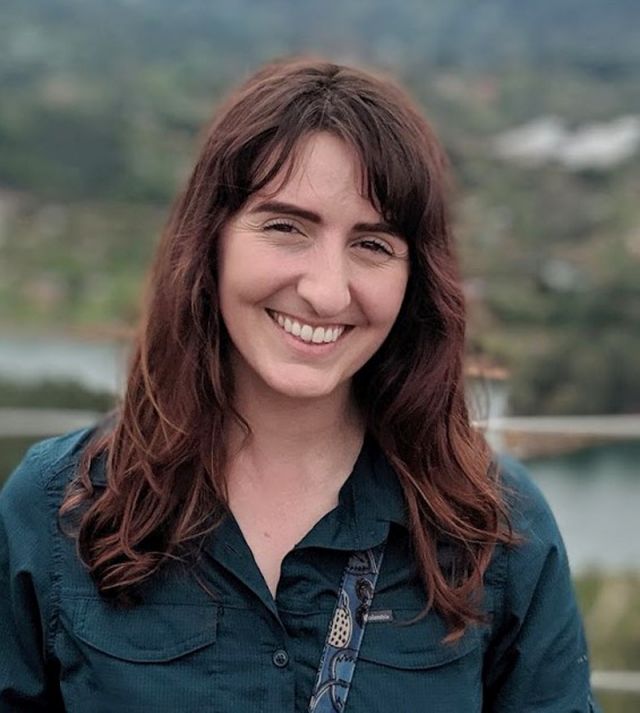
About Alex
Alex Downs, Ph.D., our recent Alumnus originally from Mesa, Arizona, earned her B.S. in Biosystems Engineering with a minor in Materials Science and Engineering at the University of Arizona and she recently earned her Ph.D. in Mechanical Engineering with a Ph.D. Emphasis in Bioengineering at UCSB. Her main area of research is in electrochemical biosensing.
Why UCSB?
I initially chose to come to UCSB because of the incredible nanofabrication facility, and generally how friendly everyone was at the campus visit.
Why Optional Ph.D. Bioengineering Emphasis?
I chose the Bioengineeing Emphasis because my original background is in Bioengineering, and was excited to take classes that interested me and be part of a community of people with similar interests.
What were your highlights of the Optional Ph.D. Bioengineering Emphasis?
I really enjoyed the student-run seminars and the faculty visits. It was a great opportunity to meet new people, both at UCSB and from other places.
I especially liked the course that included a lot of guest lectures, ENGR 220B. I remember really clearly enjoying Dr. Mitragotri's lecture on drug delivery. It's not a topic I do research in, but is fascinating.
What is your area of research?
I focus on electrochemical biosensors for real-time, in-body monitoring. During graduate school, I've worked a lot with electrochemical aptamer-based sensors for pharmaceutical monitoring.
Why and how did you choose your Area of Research?
In undergraduate, I tried out many different research areas, like entomology, biosensing, and biofuels. For graduate school, I was particularly drawn to the biosensing field because, honestly, it's difficult to get bored there. There are so many different types of biosensors with so many different detection mechanisms. It's also a commercially relevant field, as we could really use a greater variety of biosensors for personal monitoring
My PhD has taken me down many different paths, with projects involving implantable biosensors, nanoporous gold, and understanding sensor stability in really challenging biological environments. A lot of my research questions relate to better understanding biosensing interfaces, and how they can be applied to make actual commercializable devices. I'd love to see more wearable biosensors on the market, and I'd like pursuing research that moves our biosensing technologies closer to commercial applications.
What do you find rewarding about your research?
I love understanding and solving problems! Biosensing, especially in blood samples or in the living body, involves a lot of troubleshooting. In addition to that, I found the research environment itself rewarding. Research is often a struggle, but the Plaxco group has so many good people to talk to during long titrations and sensor prep sessions. Having smart, funny people to talk to made days more fun and memorable, for sure.
Tips for those interested in research?
My biggest piece of advice is to put yourself out there as much as you can and try different research area. Especially in undergraduate when opportunities are a little more fluid. Many universities have some sort of paid research program in the summer, and on the national level there's the REU, SULI program, etc. Many companies offer summer research jobs, too. Beyond that, look into the research happening at your institution and don't be afraid to email professors asking to work in their group.
Another piece of advice I have broadly is to brush up on writing skills. Writing is a gateway to many research opportunities, and funding too. I owe a lot of what I know to an undergraduate technical writing course. If your program offers a science writing course, check it out!
Important Awards and Honors?
During my PhD, my most important award was the NSF GRFP, which I was extremely grateful to receive. It really opened up my PhD to explore different topics and find an area of research that I love. I recently was awarded the Hruby Fellowship from Sandia National Laboratories, which provides three years of funding and to explore some of my ideas relating to biosensing.
Which of your papers have been published?
I have a few works under submission still, which I am excited to get out there!
Downs, A.M., Gerson, J., Hossain, M.N., Ploense, K., Pham, M., Kraatz, H.B., Kippin, T., Plaxco, K.W. “Nanoporous Gold for the Miniaturization of In Vivo Electrochemical Aptamer-Based Sensors.” ACS Sensors. 2021.
Downs, A.M., Gerson, J., Ploense, K., Plaxco, K.W., Dauphin-Ducharme, P. “Sub-second-resolved Molecular Measurements Using Electrochemical Phase Interrogation of Aptamer-Based Sensors.” Analytical Chemistry. 2020.
Downs, A.M., McCallum, C., Pennathur, S. “Confinement Effects on DNA Hybridization in Electrokinetic Micro- and Nanofluidic Systems.” Electrophoresis. 2019.
Where will you be working now?
In October, I will be starting a 3-year postdoctoral fellowship at Sandia National Laboratories. I'm excited to expand on my skills in biosensing there, and learn about what life looks like as a scientist at Sandia.
What are your favorite things about the following?
Hobbies:
My favorite hobby is probably cooking - I am always trying new things, and have a hefty collection of cookbooks and spices. Aside from that, I love block carvings for printmaking, and screen printing clothing.
UCSB: My favorite part about UCSB was the people. Everyone in my lab is so fantastically smart, funny, and supportive. I will miss chatting with people in the Bioengineering building during long experiments, and I'll miss the beautiful mountain views from lab. It was an incredibly positive environment to work.
Santa Barbara: Most people would probably say, "the beach," but I would have to say I loved the bakeries the most. In spite of being a small town, Santa Barbara has so many wonderful bakeries run by really kind people. Whenever someone comes in town, I love taking them to visit Renaud's, Breeosh, or Anna's Bakery.